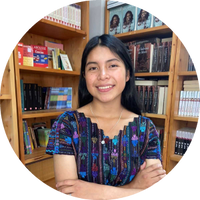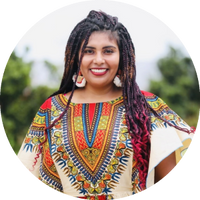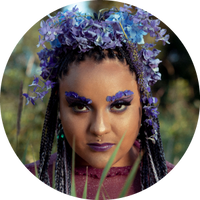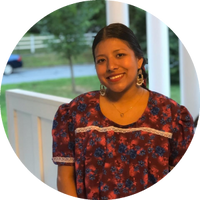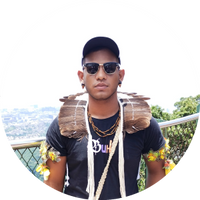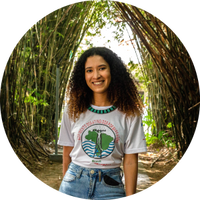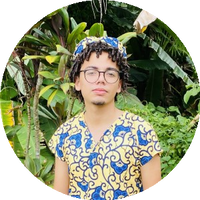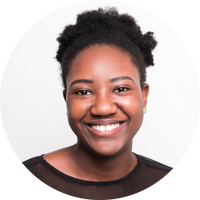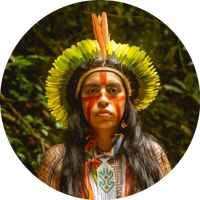Scholars
Adela Esther Tuy Tuy (19), Guatemala
Adela is a Maya Kaqchikel writer from Sololá, Guatemala. She is an ambassador for Girl Rising and a writer for The Teen Magazine. Since age 13, she has been writing and drawing. In 2021, she founded Up&Up, a collective for young Indigenous women. She moderated Tzijonem ("Let's Talk" in Kaqchikel), interviewing influential figures. At 17, she published her first articles in Entre Mundos and We All Grow Latina. She has participated in podcasts, won a narrative contest, and published her first poetry book, Keme. She studies Social Communication Sciences and aspires to be a writer and storyteller.
Ana Yency Lemus Chávez (29), El Salvador
Ana identifies as an Afro-Salvadoran woman of the Panune ethnicity, she is an activist, advocate for the human rights of the Afro-descendant population, and environmentalist in El Salvador. In 2021, she presented a proposal for a law on nature rights and combating climate change, and in 2017, 2019, and 2023 she presented reform proposals to congressmen and officials of the country for the recognition of the Afro-descendant population in El Salvador and the defence of their territories as well as care and respect for the environment. She founded and directs the Salvadoran Afro-descendant Organized Foundation and fights for climate justice.
Antumalen Ayelen Antillanca Urrutia (25), Chile
Antumalen is a young Huilliche Mapuche from the southern Wallmapu/Chile, residing amidst Lake Ranco, the third largest lake in Chile, and belongs to the ancestral Mapuche community of Isla Huapi. Since 2020, in collaboration with her family, she has led the self-convened project "Epu Lafken Mapu," a collective that brings together Mapuche communities and scientific collaborators to monitor the water quality of the Ranco and Maihue lake basin. Antumalen is a defender of her lake, as she lives amidst it. To this day, her community still lacks drinking water and they take water directly from the lake. Therefore, her life goal as an islander generation is to fight for a healthy lake free of pollution.
Betzabeth Martínez Gutiérrez (24), México
Betzabeth is a Zapotec woman from Santiago Matatlán, Oaxaca, known as the mezcal capital of the world. She holds an Accounting degree from UNAM. Since childhood, she has led environmental projects like tree planting and waste management. Over time, she expanded her work to human rights, Indigenous women’s empowerment, and language preservation. In 2019, she received the State Youth Prize and was a US Embassy fellow. Today, she collaborates on environmental projects, focusing on sustainability in her community and the mezcal industry.
Ervison Araújo Silva (25), Brasil
Wrakitã Terê is an Indigenous leader, apprentice shaman, and representative of the Tonã - Toá youth collective, promoting Geripankó culture. He is part of the youth segment of APOINME, supporting Indigenous rights in Northeast Brazil. At 25, he became the first municipal secretary for Indigenous and Quilombola peoples in his city, where over half the population is Indigenous. With the support of community leaders, he works toward securing land and territory for future generations.
Gabrielle Pompeu Sodré (25), Brasil
Gabrielle is a resident of the western region of Bahia, an area historically affected by drought and marked by the fight against agribusiness and companies building dams, violating human and environmental rights. She is organized within the Movement of People Affected by Dams (MAB), where she fights for rights and against social and environmental injustices in her region and throughout Brazil. Through MAB, she has contributed to resistance processes in various regions of the northern and northeastern parts of the country, including areas of Cerrado, Caatinga, and the Amazon, as well as facing extreme weather events.
Hellen Freitas Ferreira (24), Brasil
Hellen is a co-founder and coordinator of the social project "Mais Por Nós," focused on the community of Belford Roxo/RJ, especially in areas of social vulnerability. She is currently studying Psychology at the Federal University of Rio de Janeiro. She is also a member of the "Black Women Doing Science" project of the Gender Studies and Ethnic-Racial Relations in Science and Health Education Center (NEGRECS) at the Nutes Institute (UFRJ). As a fellow at the Laboratory of Digital Identities and Diversity, she researches racial relations, gender, sexuality, impacts of climate change, and minority populations. Her personal goal is to impact lives and transform realities.
Jeyreel Emanuel Mora Solano (18), Costa Rica
Jeyreel is of Afro-descendant ancestry and a member of the LGBTQ+ community, he is a social and environmental activist and student leader. Identified with the left and human rights, he considers himself an eco-socialist and is recognized in his city as a passionate advocate for climate and ecology. He has led student groups and youth organizations dedicated to environmental justice and sustainability.
Juliana Melisa Asprilla Cabezas (25), Colombia
With a degree in Sociology from the Universidad del Valle, she has focused her professional career on social intervention, community management, and research on gender, race, ethnicity, and peace. She has coordinated educational projects, prevention of gender violence, mental health, and social entrepreneurship. Her commitment as a community leader is reflected in her active pursuit of ethnic-racial inclusion and equity, promoting diversity of identities for a more comprehensive and equitable approach in all her initiatives. Additionally, she shows interest in climate justice in the Global South, advocating for solutions that address social equity and environmental sustainability.
Rayane da Silva França (22), Brasil
Yawadj Xipai, also known as Rayane in her civil identification, was born and raised in the Middle Xingu region, specifically in Altamira. At 22, she is studying International Relations at the Federal University of Santa Maria, in Rio Grande do Sul. As the first indigenous woman in her field of study, Yawadj carries a great responsibility. She has specialized in climate issues, international recognition law, gender, and race, with the aim of helping other young people access and occupy these spaces.
Sydney Mishel Males Muenala (27), Ecuador
Sydney is a Kichwa Otavalo activist dedicated to racial, climate, and human rights. She earned a full scholarship for a master's at FLACSO, researching mining’s impact on Indigenous communities. As vice president of the Kichwa Council of Otavalo, she led environmental initiatives. She has represented Indigenous rights at UN forums, founded the Wallpay Crew Collective, and worked with organizations like Hakhu Amazonia. She has spoken at COP27 and the UN Permanent Forum on Indigenous Issues.
